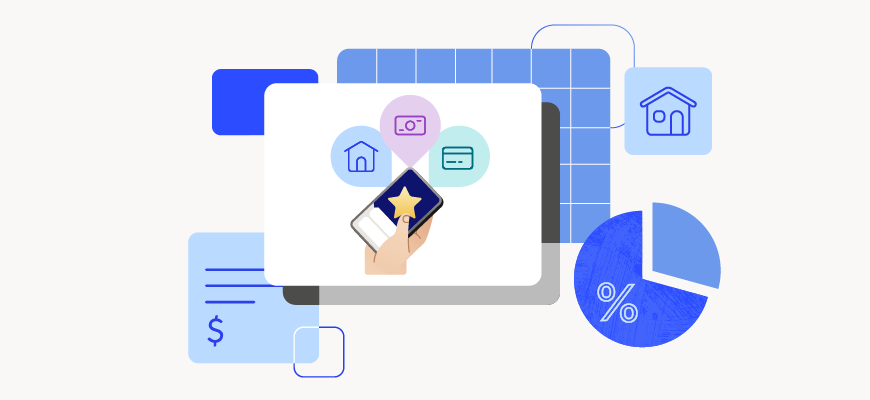If, like most Canadians, you’re carrying some form of debt, you’re likely wondering what this half point increase in interest rates, announced on April 13, means for your debt repayment. Let’s take a look at why the Bank of Canada is raising interest rates, what it means for your budget, and how you can protect your finances.
This was the second time this year that the Bank of Canada has raised interest rates, bringing the overnight lending rate to 1% from 0.5%.
Why did Bank of Canada raise interest rates?One of the Bank of Canada’s most important mandates is controlling inflation. With inflation at a 30-year high, our central bank felt it needed to step in and do something to help cool inflation, so it used the biggest tool in its toolbox and raised interest rates. Higher interest rates make it more expensive for Canadian consumers to borrow money, which in theory should lower spending and thus lower the rate of inflation over time.
When was the last time interest rates rose by 0.5%?What makes this 0.5% interest rate increase noteworthy is that it’s the single biggest interest rate hike in over two decades. Until this month, we had only ever seen quarter point interest rate hikes from our central bank since the year 2000.
What does the interest rate hike say about Canada’s current economic situation?In theory, the Bank of Canada hiking interest rates is good news because inflation traditionally signals that the Canadian economy is in good shape, and that our central bank believes Canadians can handle the interest rate increase. In the past, the Bank of Canada increased interest rates during periods of economic growth and cut interest rates during economic downturns (such as the start of COVID in 2020). However, consumers with debt tied to the prime rate may not see this announcement as good news.
What types of credit products will be affected by this interest rate change?Anyone with debt tied to the prime rate will be affected by this hike in interest rates. The types of credit products affected by this include variable rate mortgages, lines of credit and HELOCs, to name a few.
In most cases, you’ll see your minimum payment go up as a result. The only exception to this is variable rate mortgages with a fixed payment. If you have one of those, your payment will stay the same, although more of your money will go towards interest and less towards principal.
Sample calculationA half percentage point increase may sound like a lot, in fact interest rates have doubled from 0.5% to 1%. So does that mean your payments will double? Let’s run through a sample calculation to see what the increase in interest rates means for you. To do that, it helps to look at the single biggest debt for most Canadians: their mortgage.
For every $100k owing on your mortgage, you’re looking at an increase of about $24 on your monthly payment. That means that if you have a $500k mortgage, you’re looking at about a $120 total increase in your monthly payment.
Which types of credit products won’t be affected?Not all debt is tied to the prime rate, so there are some credit products that won’t be affected. For example, if you have a fixed rate mortgage, it won’t be affected by the increase in interest rates. You’re guaranteed the same mortgage rate and payment until your mortgage comes up for renewal.
Likewise, if you have credit cards and installment loans, those won’t be affected by interest rates rising either, so your interest rate and payments should remain the same.
How to cope with the interest rate increase
Lock in a fixed mortgage rateHomeowners with a variable rate mortgage or aspiring buyers can look into locking a fixed rate if the idea of for further rate hikes is keeping you up at night. However, keep in mind that fixed rates are quite a bit higher than variable rates, so you’ll be paying a premium to do that.
That being said, if you’re concerned that the Bank of Canada will hike interest rates even more than predicted, this can be a way to protect yourself from payment shock if that indeed happens.
Talk to your lenders if there’s a risk to your ability to make paymentsIf there’s a risk of not being able to make one of your bill payments, or if you’ve already missed a payment, there are options to help manage the situation. Contact your lender to ask about options for payment extensions or deferrals. These companies can often work out a payment plan with their customers, as they’re ultimately interested in being paid what they’re owed.
Is the rate hike actually good news for some people?Although borrowers with debt tied to the prime rate may not be too happy about the interest rate increase, the rate hike is actually good news for some people; mainly savers.
As a saver, it’s been tough to earn a decent rate of return over the last couple of years, with most savings accounts not even keeping up with the rate of inflation. The only way to potentially make money on your savings when interest rates are low is by taking more risk and investing in the stock market. This doesn’t make sense for some, especially those who have a lower tolerance for risk or are saving for a shorter-term goal.
The good news is that higher interest rates for borrowers also means higher savings account rates for savers, providing you with a bigger incentive to save your money. You may be able to earn a savings account rate that keeps up with the rate of inflation or even exceeds it, meaning your savings will be earning you money. Log into your Borrowell account to compare different savings accounts and their interest rates.











